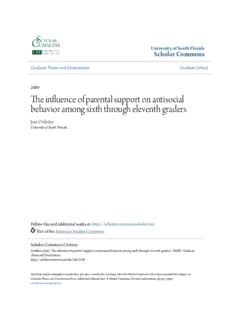
The influence of parental support on antisocial behavior among sixth through eleventh graders PDF
Preview The influence of parental support on antisocial behavior among sixth through eleventh graders
UUnniivveerrssiittyy ooff SSoouutthh FFlloorriiddaa DDiiggiittaall CCoommmmoonnss @@ UUnniivveerrssiittyy ooff SSoouutthh FFlloorriiddaa USF Tampa Graduate Theses and Dissertations USF Graduate Theses and Dissertations 2009 TThhee iinnflfluueennccee ooff ppaarreennttaall ssuuppppoorrtt oonn aannttiissoocciiaall bbeehhaavviioorr aammoonngg ssiixxtthh tthhrroouugghh eelleevveenntthh ggrraaddeerrss José Ordóñez University of South Florida Follow this and additional works at: https://digitalcommons.usf.edu/etd Part of the American Studies Commons SScchhoollaarr CCoommmmoonnss CCiittaattiioonn Ordóñez, José, "The influence of parental support on antisocial behavior among sixth through eleventh graders" (2009). USF Tampa Graduate Theses and Dissertations. https://digitalcommons.usf.edu/etd/2126 This Dissertation is brought to you for free and open access by the USF Graduate Theses and Dissertations at Digital Commons @ University of South Florida. It has been accepted for inclusion in USF Tampa Graduate Theses and Dissertations by an authorized administrator of Digital Commons @ University of South Florida. For more information, please contact [email protected]. The Influence of Parental Support on Antisocial Behavior Among Sixth Through Eleventh Graders by José Ordóñez A dissertation submitted in partial fulfillment of the requirements for the degree of Doctor of Philosophy Department of Criminology College of Behavioral and Community Sciences University of South Florida Major Professor: Christine Sellers, Ph.D. Thomas Mieczkowski, Ph.D. Shayne Jones, Ph.D. Michael Lynch, Ph.D. Date of Approval: September 23rd, 2009 Keywords: Parents, adolescent misbehavior, social learning, school context, multilevel modeling. © Copyright 2009, José Ordóñez Dedication To my wife Pierina and my son Jean Franco, for being the inspiration to achieve the highest goals. To my parents Robertina and Alejo, for their unconditional support. Acknowledgements I wish to thank my Major Professor, Dr. Christine Sellers, for her support and wise advices to analyze and integrate criminological theories. I would also like to thank Dr. Carol Bryant and the Florida Prevention Research Center at USF for the willingness to provide the dataset which made possible this research effort. Finally, I would like to express my deepest gratitude to the committee members who contributed with their expertise in the preparation of this dissertation. Table of Contents List of Tables iii List of Figures iv Abstract v Chapter One: Introduction 1 Chapter Two: Parental Support and Antisocial Behavior. 8 Social Support Paradigm 8 Social Learning Perceptive on Parental Support 16 Parental Support and Adolescent’s Social Learning Process 21 Parental Support and Peer Influence 24 The School Context and Differential Social Support 27 Differential Social Support 31 School Connectedness 33 Peer Drinking Groups 35 Chapter Three: Method 37 Conceptual Model 37 Hypotheses 39 Data Collection and Sample 39 Measures of Variables 40 Methodological Approach 46 Chapter Four: Results 50 Bivariate Analyses 50 Parental Support and Antisocial Behavior 52 Parental Supports and Social Learning: Mediation Analyses 54 Unconditional Model 57 Differential Social Support: HLM 58 Chapter Five: Discussion 62 References 72 i Appendices 92 Appendix A: Research Variables in the Multilevel Model 93 Appendix B: Antisocial Behavior Scale 94 Appendix C: Parental Support Scale 95 Appendix D: Maternal Support Scale 96 Appendix E: Paternal Support Scale 97 Appendix F: Emotional Reinforcement Scale 98 Appendix G: Social Reinforcement Scale 99 Appendix H: Differential Reinforcement Scale 100 Appendix I: Neutralizing Definitions Scale 101 Appendix J: School Connectedness Scale 102 About the Author End Page ii List of Tables Table 1 Correlation among Study Variables 51 Table 2 Research Models for Antisocial Behavior (Level 1) 53 Table 3 Unconditional Model: One-way ANOVA 58 Table 4 Research Models for Antisocial Behavior (Level 2) 60 iii List of Figures Figure 1 Research Model: Stage 1 37 Figure 2 Multilevel Research Model: Stage 2 38 iv The Influence of Parental Support on Antisocial Behavior Among Sixth Through Eleventh Graders José Ordóñez ABSTRACT The primary objective of this study was to explore the influence of parental support on antisocial behavior among 1514 adolescents from Sarasota County (Florida). An integrated multilevel approach was developed considering elements of the social support paradigm and social learning theory. Using Hierarchical Linear Modeling (HLM), the results suggest that both paternal and maternal support were significant factors in the prevention of antisocial behavior. However, paternal support demonstrated to be stronger when students justified school misbehavior. At the school level, the findings suggest that the influence of parental support to reduce antisocial behavior competes with favorable definitions toward crime learned by youngsters from society and deviant peers. v Chapter One Introduction During the last few decades some contemporary researchers in social psychology and sociology have been interested in the role played by social support in the origin of behavioral problems among adolescents (Bronfenbrenner, 1979; Pearson & Weiner, 1985; Lin, Dean, & Ensel, 1986; Vaux, 1988). In the field of criminology, Cullen (1994) argued that notions of social support appear in the criminological literature, although the research efforts have been dispersed among different theoretical approaches. As a result, Cullen (1994) proposed to integrate these diverse findings on social support into a coherent criminological paradigm to take a more comprehensive approach to the understanding of crime causation. According to Lin et al. (1986), social support represents the combination of expressive, instrumental, actual, and perceived forms of assistance provided to an individual (Lin et al., 1986). Likewise, Vaux (1988) proposed that social support must be considered a metaconstruct integrated by three components: support networks resources, supportive behaviors, and support appraisals. Thus, Vaux (1988:29) conceived social support as "a complex transactional process involving an active interplay between a focal person and his or her support network”. Based on this theoretical background, Cullen (1994) suggested four major dimensions of support. The first dimension is related to the perception of support, considering that people who receive support interpret, appraise, and anticipate it in the context of a given social situation. 1
Description: